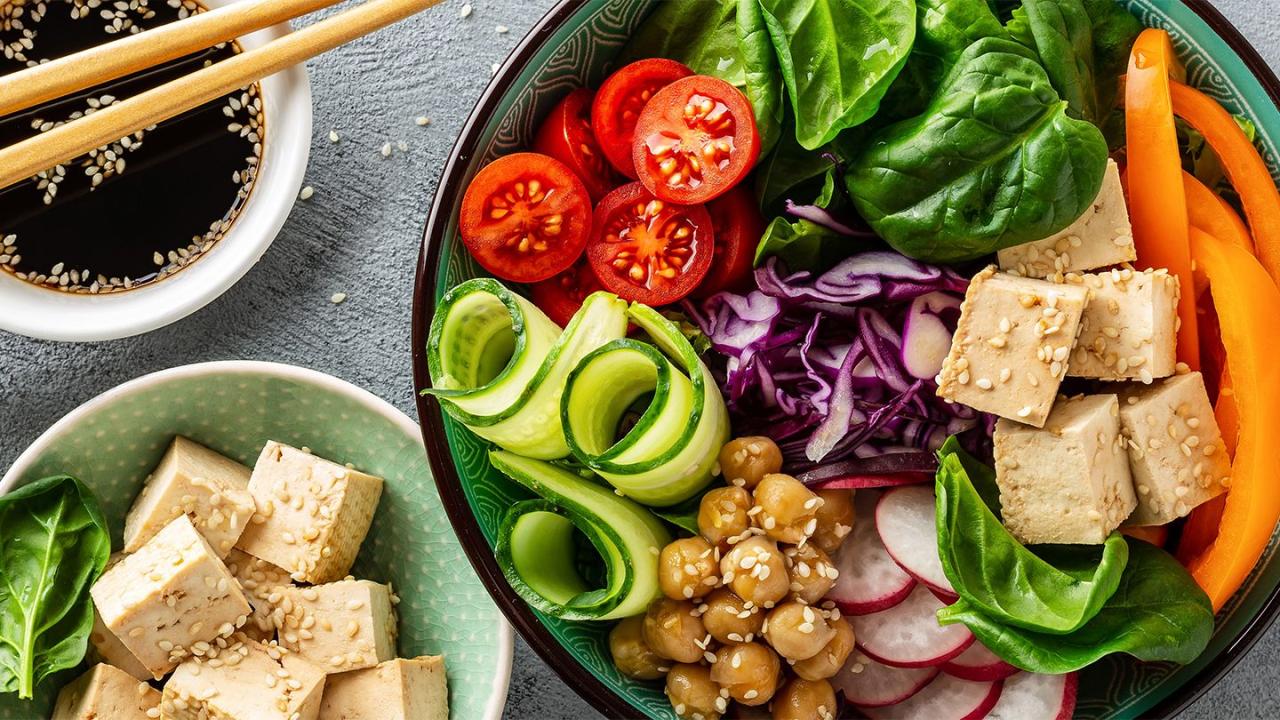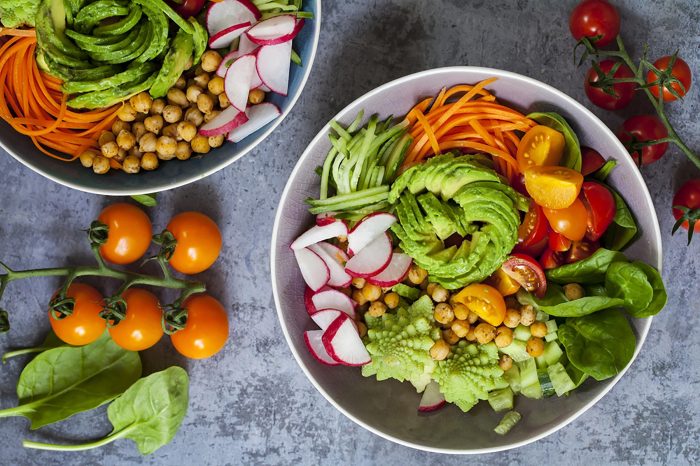How to eat a healthy vegan diet – Embark on a journey towards a healthier lifestyle with our comprehensive guide to eating a healthy vegan diet. Discover the nutritional benefits, meal planning strategies, ingredient sourcing tips, and delectable recipes that will transform your relationship with food and empower you to thrive on a plant-based path.
As you delve into this guide, you’ll uncover the secrets to creating balanced vegan meals, ensuring adequate nutrient intake, and overcoming common challenges associated with veganism. Let us be your culinary compass as we navigate the world of plant-based nutrition together.
Nutritional Benefits of a Vegan Diet
A vegan diet, devoid of animal products, offers a plethora of essential nutrients that contribute to overall well-being. By consuming a plant-based diet, individuals can reap the benefits of a nutrient-rich regimen that promotes health and vitality.
Vegans enjoy a diet abundant in vitamins, minerals, antioxidants, and fiber. Fruits, vegetables, legumes, and whole grains provide a comprehensive array of nutrients, including vitamin C, vitamin A, potassium, iron, and fiber. These nutrients play crucial roles in maintaining a healthy immune system, promoting cardiovascular health, and reducing the risk of chronic diseases.
Cardiovascular Health, How to eat a healthy vegan diet
- Vegan diets are typically low in saturated fat and cholesterol, which can contribute to lower blood pressure and improved cholesterol levels.
- The high fiber content in plant-based foods helps regulate blood sugar levels, reducing the risk of type 2 diabetes and its associated complications.
Cancer Prevention
- Fruits and vegetables are rich in antioxidants, which help protect cells from damage caused by free radicals.
- Studies have shown that vegans have a lower risk of developing certain types of cancer, including prostate cancer, colorectal cancer, and breast cancer.
Weight Management
- Vegan diets are typically lower in calories and higher in fiber than non-vegan diets.
li>The high fiber content promotes satiety, helping individuals feel fuller for longer and reducing overall calorie intake.
Environmental Sustainability
In addition to the health benefits, a vegan diet also promotes environmental sustainability. Animal agriculture is a major contributor to greenhouse gas emissions, water pollution, and deforestation. By choosing a plant-based diet, individuals can reduce their environmental impact and contribute to a more sustainable future.
Planning a Balanced Vegan Meal Plan

Creating a well-rounded vegan meal plan is essential for ensuring optimal nutrition. A balanced plan should incorporate a variety of food groups to provide the body with the necessary nutrients. It is important to focus on consuming whole, unprocessed foods, such as fruits, vegetables, legumes, whole grains, and nuts and seeds.
Ensuring Adequate Protein Intake
Vegan diets can provide ample protein if planned carefully. Good sources of plant-based protein include beans, lentils, tofu, tempeh, seitan, nuts, and seeds. Aim to include a protein source at each meal to meet daily protein requirements.
If you’re looking to shed a few pounds while embracing a plant-based lifestyle, check out how to diet as a vegetarian. This comprehensive guide provides valuable tips and meal plans to help you lose weight healthily and sustainably.
Iron Intake
Iron is an essential mineral that is often a concern for vegans. Good sources of plant-based iron include fortified cereals, leafy green vegetables, beans, and lentils. Vitamin C enhances iron absorption, so it is beneficial to consume foods rich in vitamin C, such as citrus fruits and berries, alongside iron-rich foods.
Calcium Intake
Calcium is another important nutrient to consider on a vegan diet. Good sources of plant-based calcium include fortified plant milks, leafy green vegetables, tofu, and tempeh. Additionally, it is recommended to consume foods high in vitamin D, such as fortified plant milks and mushrooms, to support calcium absorption.
Sourcing and Selecting Vegan Ingredients

Embarking on a vegan culinary adventure requires careful sourcing and selection of high-quality ingredients. By understanding the diverse options available and reading food labels diligently, you can create nutritious and flavorful vegan meals.
Plant-Based Proteins
Plant-based proteins are essential building blocks for a vegan diet. Consider these versatile sources:
- Legumes: Beans, lentils, and peas offer a rich source of protein, fiber, and iron.
- Tofu and Tempeh: Made from soybeans, these provide a complete protein profile and are versatile in culinary preparations.
- Seitan: A wheat-based protein, seitan is known for its chewy texture and high protein content.
- Nuts and Seeds: Almonds, walnuts, chia seeds, and flaxseeds are excellent sources of protein, healthy fats, and antioxidants.
Reading Food Labels
Scrutinizing food labels is crucial for vegans. Look for the following indicators:
- Vegan Certification:Labels with the Vegan Society or Vegan Action logos guarantee vegan status.
- Ingredient List:Avoid products containing animal-derived ingredients like dairy, eggs, honey, or gelatin.
- “May Contain” Statements:These indicate potential cross-contamination with animal products; proceed with caution.
- Fortified Foods:Many vegan foods are fortified with essential nutrients like vitamin B12, calcium, and iron.
Preparing Delicious Vegan Dishes

Crafting flavorful and satisfying vegan meals is an art form that combines creativity, culinary techniques, and an understanding of vegan substitutes. By mastering the art of cooking vegan, you can create dishes that tantalize your taste buds and nourish your body.
One key to creating delicious vegan dishes is to experiment with different cooking methods. Roasting vegetables brings out their natural sweetness, while steaming preserves their vibrant colors and nutrients. Grilling tofu or tempeh gives them a smoky flavor and a satisfying texture.
Cooking Vegan Substitutes
Vegan substitutes like tofu and tempeh are versatile ingredients that can be transformed into a wide variety of dishes. To enhance their flavor, marinate them in a flavorful sauce before cooking. Tofu can be pressed to remove excess water, resulting in a firmer texture that absorbs marinades better.
Tempeh, made from fermented soybeans, has a nutty flavor and a chewy texture. It can be sliced, diced, or crumbled and used in stir-fries, soups, and sandwiches.
Adopting a vegetarian diet can be a healthy and sustainable way to lose weight, but it requires careful planning. For guidance on creating a balanced and nutritious vegetarian diet, check out this comprehensive article: How to Diet as a Vegetarian.
This resource offers practical tips on incorporating protein, fiber, and essential nutrients into your meals.
Seasoning and Flavoring
Seasoning and flavoring are essential for creating vegan dishes that are both delicious and nutritious. Herbs and spices add depth and complexity to dishes, while citrus juices and vinegars provide a refreshing acidity.
Don’t be afraid to experiment with different flavor combinations. For example, try adding a dash of smoked paprika to roasted vegetables or a squeeze of lemon juice to a tofu stir-fry.
Overcoming Challenges of a Vegan Diet
Veganism, while offering numerous health benefits, can present certain challenges. These include addressing misconceptions, navigating social situations, and dining out. Additionally, seeking guidance from a healthcare professional is crucial for a balanced and healthy vegan diet.
Misconceptions and Challenges
Common misconceptions surrounding veganism include the assumption that it’s restrictive, expensive, or nutritionally deficient. However, with careful planning and knowledge, vegans can consume a wide variety of nutrient-rich foods. Another challenge is the social aspect of dining out, as vegan options may be limited in some establishments.
Social Situations and Dining Out
To overcome social challenges, vegans can bring their own food to events or inform hosts about their dietary preferences in advance. When dining out, research restaurants with vegan-friendly menus or call ahead to inquire about vegan options. Buffets and salad bars can also offer customizable options.
Healthcare Professional Consultation
Consulting with a healthcare professional, such as a registered dietitian or physician, is essential for guidance on a balanced vegan diet. They can provide personalized advice on nutrient intake, supplementation if necessary, and address any health concerns or dietary restrictions.
Closing Summary: How To Eat A Healthy Vegan Diet
Adopting a healthy vegan diet is not merely a dietary change but an investment in your overall well-being. Embrace the transformative power of plant-based nutrition and experience a newfound vitality, improved health, and a deeper connection to your food and the planet.
Remember, the journey towards a healthier lifestyle is a gradual process, and with each step you take, you’ll discover the joy and satisfaction that comes with nourishing your body and mind through a compassionate and sustainable diet.
Expert Answers
What are the key nutritional benefits of a vegan diet?
A vegan diet offers an abundance of essential nutrients, including fiber, antioxidants, vitamins, and minerals. It is rich in fruits, vegetables, whole grains, and legumes, which provide a wide range of health benefits, such as reduced risk of heart disease, certain types of cancer, and type 2 diabetes.
How do I ensure I’m getting enough protein on a vegan diet?
Plant-based proteins are abundant in a vegan diet. Excellent sources include beans, lentils, tofu, tempeh, nuts, and seeds. By combining different plant-based protein sources throughout the day, you can meet your daily protein requirements.
What are some tips for overcoming social challenges when following a vegan diet?
Communicating your dietary choices with friends and family is crucial. Politely explain your reasons for adopting a vegan lifestyle and offer to bring your own food to social gatherings. With time and understanding, those around you will become more supportive of your choices.